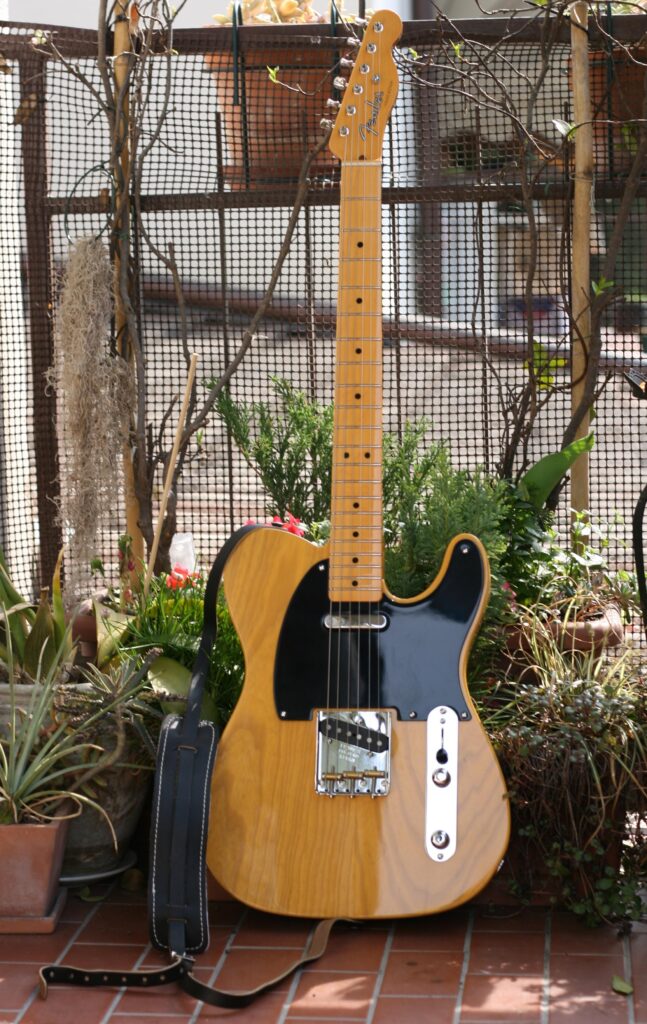Title: The Enduring Charm of Vintage Fender Stratocasters
In the world of electric guitars, few instruments carry the same legendary weight as the Fender Stratocaster. With its sleek contours, distinctive sound, and rich history, the vintage Stratocaster has become not just a tool for musicians, but a cultural icon that transcends genres and generations. From the bluesy riffs of Jimi Hendrix to the stylish solos of Eric Clapton, this guitar has carved its mark in the annals of music history. But what is it about these vintage models, created in the mid-20th century, that continues to captivate players and collectors alike? Within the resonance of their strings lies a narrative of innovation, artistry, and the timeless pursuit of sound. This article delves into the allure of vintage Fender Stratocasters, exploring their origins, the qualities that define them, and the profound impact they’ve made on the music landscape over the decades. Join us as we journey through the captivating story of an instrument that resonates far beyond its physical form.
Exploring the Timeless Design of the Vintage Fender Strat
The enduring appeal of the Fender Stratocaster lies in its iconic silhouette, a perfect marriage of form and function. With its sleek, contoured body, the Strat offers both comfort and aesthetic allure that has captivated musicians for decades. Originally designed for the burgeoning rock-and-roll scene of the 1950s, its classic outline, combined with features such as double cutaways and a floating tremolo system, allows for a versatile playing experience. The timeless finish options, whether it be the classic sunburst or eye-catching candy apple red, are testaments to the guitar’s ability to adapt to myriad musical styles while maintaining a strong visual identity.
Delving deeper into the Strat’s construction reveals a rich tradition of craftsmanship that has elevated it to legendary status. Each vintage model showcases meticulous attention to detail, with components carefully selected to optimize sound quality and playability. Key characteristics include:
- Single-coil pickups for crisp, clear tones
- Maple or rosewood fingerboards offering varied resonance
- Alder or ash bodies that enhance sustain and warmth
These elements come together to create a sonic palette that has inspired countless genres, from blues and rock to jazz and country, creating a versatile tool for artists to express their unique voices.
Vintage Save The Date
Unraveling the Iconic Sound: What Makes the Stratocaster Unique
The mesmerizing sound of the Stratocaster is often celebrated for its distinct tonal qualities that have captivated musicians and audiences alike. One of the defining features lies in its three single-coil pickups, which provide a bright, clear tone with a wide dynamic range. Unlike humbuckers, the pickups are designed to enhance the nuances of each note, allowing for expressive playing styles. This characteristic, combined with the instrument’s lightweight body and comfortable contoured shape, results in a guitar that not only feels good to play but also produces rich harmonics and resonance.
Another crucial element contributing to the Stratocaster’s uniqueness is its tremolo system. This innovative design enables players to manipulate pitch on the fly, creating a vibrato effect that has become a staple in various music genres. Additionally, the combination of the Strat’s iconic maple and rosewood fingerboards plays a pivotal role in defining its overall sound. Musicians love how easily they can glide across the frets, while the choice of wood offers different tonal characteristics. Collectively, these elements intertwine to form an iconic sound that is both versatile and instantly recognizable.
A Collectors Guide to Vintage Strat Models and Their Value
The allure of vintage Fender Stratocasters lies not only in their iconic sound but also in their rich history and craftsmanship. Collectors often seek out specific models based on their features, condition, and historical significance. Among the most sought-after vintage Strat models are the early pre-CBS versions, made before 1965, which showcase a variety of distinctive features, such as alder body construction, maple necks, and vintage-style staggered pickups. The unique tones produced by these models are often described as brighter and more resonant, making them preferable for many musicians and collectors alike.
When considering the value of vintage Strats, various factors come into play. Key elements influencing their market worth include:
- Model Year: Certain years, particularly those in the early to mid-1960s, tend to command higher prices.
- Original Parts: Guitars that retain their original components, such as pickups and hardware, are generally more valuable.
- Condition: Instruments in excellent condition with minimal wear or modifications are highly prized.
To provide insight into the market trends, here’s a brief overview of select vintage Strat models and their estimated values:
| Model Year | Estimated Value (USD) |
|---|---|
| 1954 - 1956 | $35,000 – $50,000+ |
| 1960 – 1962 | $25,000 – $40,000 |
| 1965 | $15,000 – $25,000 |
Essential Maintenance Tips for Preserving Your Vintage Fender Strat
To keep your vintage Fender Stratocaster in top shape, regular maintenance is key. Always begin by checking the neck relief to ensure that it remains straight. This can be easily done by pressing down on the first and last frets of the E string and measuring the gap at the eighth fret. A proper neck setup allows for better playability and tuning stability. Additionally, frequent string changes are vital, as old and corroded strings can damage the fretboard and affect sound quality. Consider using a soft microfiber cloth to wipe the strings after playing, which can prolong their life and maintain that crisp tone.
Another essential aspect of your vintage Strat’s upkeep is monitoring the humidity and temperature of the environment it resides in. Extreme conditions can warp the wood and damage delicate components. A ideal range of 40-60% humidity is recommended, so consider investing in a hygrometer. Furthermore, when it comes to cleaning, avoid harsh chemicals that can damage the finish. Instead, use a specialized guitar cleaner and a soft cloth to keep the body shining. To keep everything in check, you might find the following table helpful for periodic checks:
| Maintenance Task | Frequency |
|---|---|
| Neck Relief Check | Every 3 months |
| String Change | Every 1-2 weeks |
| Cleaning | After each play |
| Humidity Check | Monthly |
Iconic Players and Their Influence on the Fender Strat Legacy
The Fender Stratocaster has been a canvas for some of music history’s greatest talents, each leaving indelible marks that contribute to the guitar’s storied legacy. Jimi Hendrix, for instance, revolutionized not just the sound but also the way the instrument was played. His innovative techniques, like feedback manipulation and fingerpicking, transformed the Strat into a powerful vehicle of expression. Eric Clapton brought a sublime blues textuality to the forefront, showcasing the guitar’s capacity for emotive nuance. Coupled with their stage presence, these iconic players elevated the Strat’s status, inspiring countless musicians across generations.
Moreover, other legendary figures have woven their styles into the fabric of the Stratocaster’s history. David Gilmour’s ethereal solos and atmospheric tones introduced an entire world of possibilities for sonic exploration, making the guitar an essential tool in progressive rock. Stevie Ray Vaughan infused the Strat with raw Texas blues energy, revitalizing its appeal and reinforcing its versatility. Each of these artists did not merely play the Strat; they infused it with their unique voices, facilitating a dialogue between instrument and artist that continues to influence guitarists today. Their legacies are a testament to the enduring power and adaptability of the Fender Stratocaster.
Discovering the Best Accessories to Enhance Your Vintage Strat Experience
Unleashing the full potential of your vintage Fender Strat goes beyond just the guitar itself; it’s about the soul of the sound alongside the artistry of its accessories. To elevate your playing experience, consider incorporating high-quality pedals, which can add depth and character to your tone. Brands like Boss and Electro-Harmonix have a plethora of options ranging from overdrives to modulation pedals that can add an exciting twist to your vintage vibe. Additionally, using specialized guitar straps made from leather or vintage materials not only enhances comfort but also adds a touch of classical aesthetic that complements your Strat’s iconic look. Furthermore, don’t overlook the magic of high-end cables; investing in oxygen-free copper cables can help minimize interference and ensure every note shines through with clarity.
For those seeking a more personalized touch, crafting a custom pickguard can transform the overall appearance of your guitar. Choose a design that reflects your style—be it a classic tortoiseshell, elegant pearl, or something completely unique. Here’s a quick look at some key accessories to consider:
| Accessory Type | Top Brands | Style Options |
|---|---|---|
| Pedals | Boss, Electro-Harmonix | Overdrive, Delay, Modulation |
| Guitar Straps | Schaller, Levy’s | Leather, Cotton, Vintage Fabric |
| Guitar Cables | Mogami, Monster Cable | Oxygen-Free Copper |
| Pickguards | Custom Makers | Tortoiseshell, Pearl, Custom Design |
Q&A
Q&A: Exploring the Allure of Vintage Fender Stratocasters
Q: What defines a vintage Fender Stratocaster?
A: A vintage Fender Stratocaster typically refers to models produced between the late 1950s and early 1970s, characterized by their iconic contoured body shape, three single-coil pickups, and unique neck profiles. These instruments often exude distinct tonal characteristics and aesthetic details that set them apart from modern counterparts.
Q: Why are vintage Fender Strats considered so desirable?
A: Vintage Strats enjoy a cherished status among musicians and collectors alike due to their historical significance, craftsmanship, and the timeless sounds they produce. Many legendary guitarists, such as Jimi Hendrix and Eric Clapton, have famously played vintage Stratocasters, contributing to their allure and mythos.
Q: What should buyers look for when purchasing a vintage Strat?
A: Knowledge is key when seeking a vintage Strat. Buyers should inspect the serial number for dating accuracy, query the original components such as pickups and pots, and check for any structural issues or modifications. Provenance—having documentation of the guitar’s history—can also enhance its value.
Q: Can vintage Fender Stratocasters be played for regular gigs, or are they too delicate?
A: While vintage Strats are often considered collector’s items, many players do gig with them. However, it’s essential to handle them with care, given their age and potential fragility. Some musicians might choose to use a replica or modern Strat for gigs, preserving the vintage piece for studio work or display.
Q: What are some tonal characteristics that make the vintage Strat stand out?
A: Vintage Strats are celebrated for their bright, bell-like tones with a snappy attack, thanks to the alnico magnets used in their pickups. The diversity of sounds—from shimmering clean tones to gritty, overdriven leads—offers players a broad sonic palette, making them suitable for various genres, particularly rock, blues, and jazz.
Q: How have vintage Strats influenced modern guitar design?
A: The Fender Stratocaster has significantly impacted guitar design, leading to innovations in body shape, pickup configuration, and bridge design. Modern guitars often incorporate elements inspired by vintage Strats, such as contouring and multi-pickup setups, making the vintage Strat a foundational blueprint in the evolution of electric guitars.
Q: What’s the price range for a vintage Fender Stratocaster?
A: Pricing for vintage Fender Stratocasters varies widely based on factors like year, condition, and modifications. Generally, prices can start around a few thousand dollars for earlier models and climb to six figures for rare editions in pristine condition, making them both an investment and a collector’s dream.
Q: Are there resources for learning more about vintage Fender Stratocasters?
A: Absolutely! Numerous books, online forums, and vintage guitar expos provide valuable insights into the history, value, and maintenance of vintage Strats. Websites like Reverb and eBay also offer guitars for sale, while the Fender website hosts rich historical archives for enthusiasts to explore.
Q: How do vintage Strat enthusiasts communicate and share their passion?
A: Vintage Strat enthusiasts often connect through online forums, social media groups, and local meetups. They share tips, trade stories about their instruments, and even swap parts to restore or modify guitars, fostering a sense of community among those who appreciate the craftsmanship and artistry behind these iconic instruments.
To Conclude
In the world of music, few instruments have captured the imagination as profoundly as the vintage Fender Stratocaster. With its sleek lines, versatile sound, and rich history, the Strat has not only shaped the sound of countless genres but has also become a symbol of artistic expression for musicians around the globe. As we reflect on the legacy of this iconic guitar, it’s clear that its charm lies not just in its craftsmanship, but in the stories it tells and the emotions it evokes. Whether you’re a seasoned player or a casual listener, the allure of a vintage Strat is undeniable. As you explore its history, sound, and impact, may you find inspiration in the chords it has struck and the dreams it continues to fuel. The vintage Fender Strat isn’t just an instrument; it’s a piece of musical history waiting to be a part of your own story.


